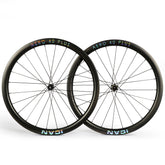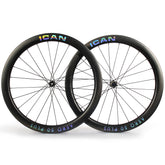Carbon Fork Guide
What is a carbon bicycle fork?
You don't have to be an avid cyclist to know which part of the bike is called the fork. Yes, the two blades connect the front wheel to the main structure of the bike. As one of the most important parts of the bike, supporting all the weight of the front wheel, a fork is usually made of iron, steel or aluminum. But it can also be made of carbon, which is much lighter than steel or even aluminum forks. Carbon bike forks are a trendy bike upgrade that can be found on almost all high-quality road bikes and racing bikes.
In general, four types of carbon blades or forks are suitable for both light and stocky riders who want a smooth ride. Let's say you want to replace your classic steel fork with a carbon fork for more reliable performance and longer durability. In this case, you should consider these four types of carbon forks: carbon road bike fork, carbon fat bike fork, carbon gravel fork and carbon mountain bike fork.
Carbon disc road fork
Road cyclists who do not ride off-road or off-road prefer to ride on flat, paved roads for fast travel; The carbon disc road fork fits your bikes perfectly. This type of fork is designed for bikes built for commuting, racing, everyday cycling, and even other recreational activities. Gone are the days when iron and steel forks gained a foothold in the market along with rigid forks of road and hybrid bikes. However, with the introduction of aluminum and carbon fiber, we are seeing a drastic change in this regard. Manufacturers of high-quality road and racing bikes have begun to adopt the crystalline structure of carbon materials in the construction of their bikes. This advanced architecture of carbon materials ensures forks are more shock-absorbing than ever before, with better aerodynamic shapes and an ultimate lightweight experience. Therefore, even heavy riders can enjoy a great ride with significantly improved comfort than steel forks.Carbon fat bike fork
Fat bikes are typically designed for off-road cycling on varied terrain where regular road bikes don't stand a chance. Since the size, weight and thickness of fat bike wheels are completely different from those of road or hybrid bikes, it's no secret that the forks will also be different. A fork is often equipped with a suspension device to provide the driver with a comfortable driving experience even on bumpy surfaces. But the fat tires are already designed for the ultimate traction of fat bikes, so the suspension is only needed for a few specialized purposes. Therefore, the rigid carbon fat bike fork is sufficient to enable varied rides. Typically made of carbon, the fat bike forks are lightweight and have large tire clearance, allowing multiple wheel sizes to be accommodated in the same fork. Since carbon has a longer lifespan than iron or steel, the carbon fork not only can handle uneven impacts, but the rigid frame also lasts long enough.
Carbon gravel fork
A gravel bike is an improved version designed for off-road use. With a combination of road and cross-country bikes, gravel bikes are ideal for cyclocross events. Carbon fiber forks are ideal for gravel bikes where riders seek unparalleled performance and excellent traction on rocky terrain. Upgrade your bike fork to exceptionally lightweight full carbon gravel materials to ride at top speed over almost any surface. Like fat bike or mountain bike forks, gravel forks are designed with more clearance for different wheel sizes and better aerodynamic benefits.Carbon mountain bike fork
Mountain bikes or MTB bikes are a special category for extreme off-road riding such as off-road, mountaineering and jungle excursions. In short, MTB bikes are designed for extreme adrenaline adventures and require a strong, rigid frame that you can rely on. Mountain bike forks are both rigid and suspended and are ideal for extreme terrain. Although there are some cheap steel forks on mountain bikes, they are no better than the lightweight and shock-absorbing carbon fiber fork that offers excellent structural coherence. When a professional rider upgrades their bike to a carbon mountain bike fork, the difference is clearly noticeable as they race over obstacles on the trail with guaranteed smoothness.
Carbon Bicycle Fork FAQs
1. Why is a carbon fork better than iron or steel forks?There are several reasons to conclude that a carbon fork is always better than classic iron or steel forks in terms of performance and effective aerodynamic design. The biggest advantage of a bike with a carbon fork is its unprecedented light weight, making it easier to ride with gravity when climbing terrain or sliding down a steep hill. The carbon fork is also ideal for stocky or heavy riders, as the lower road vibrations are immediately noticeable. Carbon forks, whether for MTB bikes or general road bikes, absorb shock more effectively than any other metallic material, providing an overall better riding experience.
2. Is a carbon bicycle fork handmade?
Yes, almost all carbon wheels you see everywhere are hand assembled. The practical work that a carbon bike requires is intense. The fork and all parts of a carbon bike must be carefully assembled, while automation plays little role.
3. Is a carbon fork better than a steel fork?
Since the introduction of carbon fiber, it has proven to be stiffer and lighter than the classic steel material used to make bicycles. Steel and iron forks are significantly heavier compared to carbon fiber forks, making the material a clear winner in the competition. A lighter bike will always offer faster performance on race tracks or regular commuting. The natural stiffness also makes carbon fiber durable enough for long-term use. Although everything has a price, a carbon fork is usually more expensive than a steel fork and has high maintenance costs. Repairing a carbon fork should also be considered because although the material is repairable, the cost can sometimes be higher than replacement.
4. Why choose carbon bike fork?
A carbon bicycle fork is typically lighter and more forgiving than steel or iron. It is less stiff over bumps and curves. The heavier you are and the faster you go, the greater the benefits. If you are looking for a smooth ride, go for carbon bike forks. However, keep in mind that these may cost more than steel forks.






